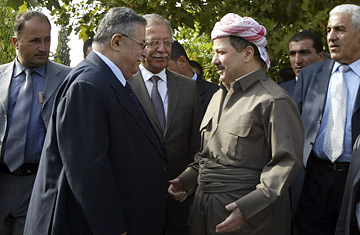
Iraqi President Jalal Talabani greets Massoud Barzani, leader of Iraq's Kurdish region, in the city of Irbil, Iraq on October 21, 2007.
Iraq is like trying to nail down a warped board. As soon as we start to get a handle on one problem, like the violence in Anbar province, another, such as what's currently brewing in Kurdistan, creeps up.
Fortunately, the Iraqi Kurdish problem is fixable. For a start, Jalal Talabani will have to stop acting like a Kurdish national resistance leader and more like a President. What he has to do is kick the Turkish Workers' Party, the PKK, out of Iraq. I am told it would be fairly easy because most of the PKK's fighters operate from within Turkey rather than Iraq.
By now, I would have hoped that Talabani would have understood that the last thing the Iraqi Kurds need is to incite Kurds in neighboring countries. At the moment, there are three or four international oil companies ready to drill in the north. The only practical oil route is through Turkey — which of course the Turks will close if the Kurds don't do something about the PKK.
But like everything else in Iraq, it's not that simple. There is, for starters, the perception problem of an apparent U.S. double standard with regard to Kurdish insurgents. The Bush Administration, in its effort to force Iran to give up its nuclear weapons program and stop arming and funding disruptive Shi'a parties in Iraq, has not attempted to hide its sympathy for Iranian Kurds — the Party of Free Life of Kurdistan, or PJAK. The PJAK operates from Iraqi Kurdistan and reportedly has been making regular forays into Iran, attacking Iranian army units, and returning to Iraq. The PJAK operates with relative impunity, knowing that if the Iranians would dare pursue them into Iraq, chances are that Bush would use it as pretext to hit Iran.
The Iranians are convinced we are arming and funding the PJAK. Sources tell me that our military meets the PJAK to collect intelligence on Iran, particularly concerning Iran's meddling in Iraq. Money no doubt changes hands. But who knows whether it goes to the PJAK to buy bullets or snitches. Under Title X, the U.S. code that governs the war in Iraq, the military is not obligated to sort out what the money is used for. Anyhow, who really cares in the middle of a hot war?
It still leaves us with sorting out the good Kurds from the bad Kurds. Frankly, I don't see how it can be done. We do not have the forces to patrol the border between Iraq and Turkey. It would take at least another hundred thousand troops. We have little or no political leverage over Talabani, who on occasion has told interlocutors that the Turkish General Staff is funding the PKK — presumably to unbalance Turkish democracy and justify a coup d'etat. It's nonsense, of course, but demonstrates that Talabani is still not ready to confront the PKK.
We should all keep our fingers crossed and hope the Iraqi Kurds come to their senses and do something about the PKK. If they don't, we're going to take one more walk along the abyss — Turkey and Iran coming together and ganging up on the Kurds. Talk about a board we'll never nail down.
Robert Baer, a former CIA field officer assigned to the Middle East, is TIME.com's intelligence columnist and the author of See No Evil and, most recently, the novel Blow the House Down
